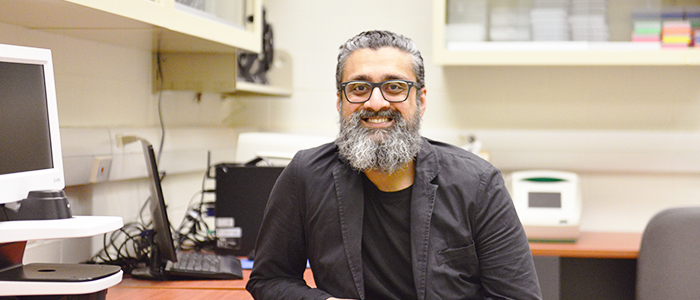Fostering young minds in the lab

By Ciara Parsons, BA'15
In 2008, Martin Chalfie, PhD, was awarded the Nobel Prize in Chemistry for his role in the discovery and development of the green fluorescent protein (GFP). This scientific breakthrough has become an integral part of genetic engineering, especially when studying biological processes in cells, as the luminous properties of GFP have simplified the process of tracking proteins and cells in organisms.
And with Chalfie travelling to Western University on December 14 for the Paterson Lecture, there is much excitement on campus in anticipation of his keynote presentation.
“Chalfie’s discovery is one of those findings in science that really changes the way we as scientists approach research. GFP is one of the most widely used tools and he has completely changed the landscape of what we do,” said Zia Khan, PhD, associate professor, Department of Pathology and Laboratory Medicine.
As one of the individuals within the Department of Pathology & Laboratory Medicine who assisted with the selection process for this year’s Paterson Lecture speaker, Khan says scientists like Chalfie are role models because they demonstrate the essence of scientific leadership and people like him have helped to inspire his career as a scientist and academic supervisor of graduate trainees.
“The way I approach almost anything in life is because of all the positive interactions I’ve had with wonderful people and what I’ve learned from them. From the way I write, think, manage my lab, and even the way I try to serve my department and graduate trainees is based on the encounters I’ve had and learning from them,” he said.
Khan is passionate about fostering young scientists-in-the-making and believes events like the Paterson Lecture help to show graduate trainees the ‘silent’ factors involved in science, such as perseverance, problem-solving, process and creativity.
Pursuing those questions that ‘keep you up at night’ is what science is all about for Khan, which is why every few years he changes his research focus.
“My training is sort of a ‘mish-mash’ of different subjects, like neuroscience, biochemistry, immunology and cell biology. I try to answer questions through research that are interesting to me,” he said.
Crediting the ‘rules’ he follows in his own life, Khan says hard work, living life for other people and trying to imitate people you admire or deem to be a success are also lessons he tries to pass on to the graduate trainees he supervises.
He believes that even though young researchers may have different skills and potential at the early points of their careers, they can all achieve success if they commit to their work and have a desire to create new knowledge.
With a successful research program and a track-record of producing award winning graduate trainees, Khan says having an ‘open door’ policy to research and being discovery driven has been beneficial.
“The way I look at it, I may potentially be at the peak of my creativity, but where I have untapped potential lies in the trainees I have in my lab,” said Khan. “Somehow, if I can create ‘super minions’ who can contribute to science—then I would feel I have been successful and done my job as a supervisor.”
The Paterson Lecture is taking place on Thursday, December 14, 2017 from 12 p.m. to 1 p.m. in Auditorium A of University Hospital.
For more information about the Paterson Lecture, click here.








